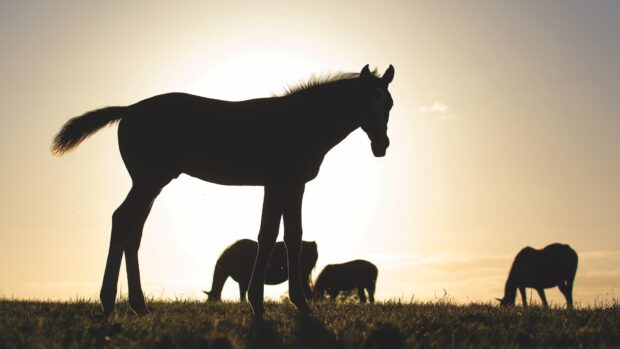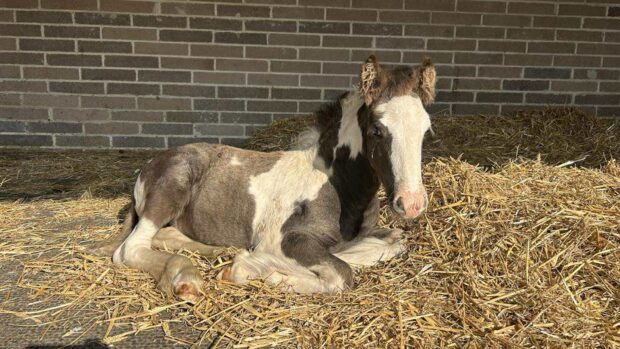Gut bacteria in foals at 28 days old have “significant” links to both their health and athletic performance later in life.
The findings are the result of a ground-breaking new study by researchers at the University of Surrey’s veterinary medicine and bioscience departments, led by Professor Chris Proudman.
The researchers found that the future athletic performance of the foals involved was positively associated with higher bacterial diversity in their poo at one month old.
They also investigated the long-term impact of foals receiving antibiotics during the first month of life and found these had lower faecal bacterial diversity than their counterparts, won less prize money, and had significantly increased rate of developing respiratory disease. They also identified that low gut bacterial diversity in early life is associated with an increased risk of soft-tissue and orthopaedic issues developing later.
The study highlights the “profound and enduring impact” that gut health as a foal has on racehorse health and performance, and why antibiotics “need to be used responsibly”.
A total of 438 poo samples from 52 thoroughbred foals were analysed and respiratory, gastrointestinal, orthopaedic and soft-tissue health issues were tracked from birth to three years old. The foals came from five stud farms and went into training with 29 different trainers.
Professor Proudman told H&H the primary objective of the study was to look at associations between early life gut bacterial communities and health outcomes.
“We know from existing work that these early life gut communities are important in the process of immunological priming of animals and humans in those very first weeks of life. That in turn affects how susceptible animals and humans are to disease in the future,” he said.
“We were particularly interested in respiratory disease, because this is a major problem in young racehorses in particular. We did find that there were associations, particularly between low gut bacterial diversity and increased risk of respiratory disease later in life.”
He said the disease link was consistent with evidence from research in humans and other animals, but added that the associations with athletic performance were a surprise.
“It blows my mind really to think that what is happening at one month old is a predictor of how those horses are going to perform on the racecourse up to three years later,” he said.
The long-term health and wellbeing implications are significant in the context of life-long equine welfare, beyond a horse’s racing career.
“This is very much making sure that right from the outset as very young foals, we understand the determinants of health and that we are setting them up for a healthy life,” he said. “By making sure that gut microbiota is as healthy as possible in those early weeks and months, we can set them up for a good life.
“We talk about the ‘one health’ agenda, which is the health of humans, animals and the environment all being interlinked and inseparable. It’s further evidence to support this basic biological principle, that early life gut microbiota, microbial communities, influence health for the rest of the animal’s life.”
He said that there are cases that need antibiotics, but that this highlights why responsible use is vital – noting that antimicrobial resistance is a risk to animals and humans.
Professor Roberto La Ragione, co-investigator from the university’s school of bioscience, agreed, adding: “Antibiotics are vital in treating infections and protecting the long-term health of foals; they do, however, need to be used responsibly.
“Our study demonstrates that treatment with antibiotics can disrupt the healthy gut microbiome with long-term impacts on health and performance.”
Leading breeder Kirsten Rausing, chairman of the International Thoroughbred Breeders’ Federation, sponsored the study through her charitable foundation the Alborada Trust.
“This ground-breaking study has identified the importance of gut health in our very young foals. As breeders, if we can get this right, we will produce foals that will be healthier, and will grow into more successful racehorses,” said Dr Rausing.
The Alborada Trust is also funding research into how to minimise disruption of gut bacteria when antibiotics are needed to treat infections, plus from where foals get their early life gut bacteria. The Horserace Betting Levy Board is also funding connected research into identifying bacteria that seem to be associated with healthy outcomes and investigating their use as potential probiotics.
- To stay up to date with all the breaking news throughout the Paralympic Games, Burghley, HOYS and more, subscribe to the Horse & Hound website
You might also be interested in:

Scientists aim to identify ‘spooky’ genes in new equine research

Subscribe to Horse & Hound magazine today – and enjoy unlimited website access all year round

New research highlights links between stress, genes, and behaviour in equines




